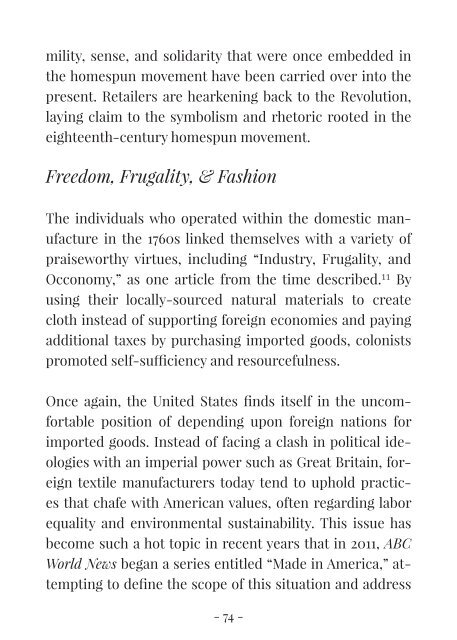The Fleece of Their Flock: Homespun & the American Identity
This interdisciplinary thesis project was researched, written, and designed by Jessica Vodnik and submitted in fulfillment of the Honors Senior Capstone requirement for the DePaul University Honors Program. Please do not copy, reproduce, or distribute without permission. Dr. Amy Tyson, Director, American Studies Dr. John Burton, Second Reader, History Undergraduate Honors Senior Thesis DePaul University, Chicago, IL May 10, 2015
This interdisciplinary thesis project was researched, written, and designed by Jessica Vodnik and submitted in fulfillment of the Honors Senior Capstone requirement for the DePaul University Honors Program. Please do not copy, reproduce, or distribute without permission.
Dr. Amy Tyson, Director, American Studies
Dr. John Burton, Second Reader, History
Undergraduate Honors Senior Thesis
DePaul University, Chicago, IL
May 10, 2015
You also want an ePaper? Increase the reach of your titles
YUMPU automatically turns print PDFs into web optimized ePapers that Google loves.
mility, sense, and solidarity that were once embedded in<br />
<strong>the</strong> homespun movement have been carried over into <strong>the</strong><br />
present. Retailers are hearkening back to <strong>the</strong> Revolution,<br />
laying claim to <strong>the</strong> symbolism and rhetoric rooted in <strong>the</strong><br />
eighteenth-century homespun movement.<br />
Freedom, Frugality, & Fashion<br />
<strong>The</strong> individuals who operated within <strong>the</strong> domestic manufacture<br />
in <strong>the</strong> 1760s linked <strong>the</strong>mselves with a variety <strong>of</strong><br />
praiseworthy virtues, including “Industry, Frugality, and<br />
Occonomy,” as one article from <strong>the</strong> time described. 11 By<br />
using <strong>the</strong>ir locally-sourced natural materials to create<br />
cloth instead <strong>of</strong> supporting foreign economies and paying<br />
additional taxes by purchasing imported goods, colonists<br />
promoted self-sufficiency and resourcefulness.<br />
Once again, <strong>the</strong> United States finds itself in <strong>the</strong> uncomfortable<br />
position <strong>of</strong> depending upon foreign nations for<br />
imported goods. Instead <strong>of</strong> facing a clash in political ideologies<br />
with an imperial power such as Great Britain, foreign<br />
textile manufacturers today tend to uphold practices<br />
that chafe with <strong>American</strong> values, <strong>of</strong>ten regarding labor<br />
equality and environmental sustainability. This issue has<br />
become such a hot topic in recent years that in 2011, ABC<br />
World News began a series entitled “Made in America,” attempting<br />
to define <strong>the</strong> scope <strong>of</strong> this situation and address<br />
- 74 -


